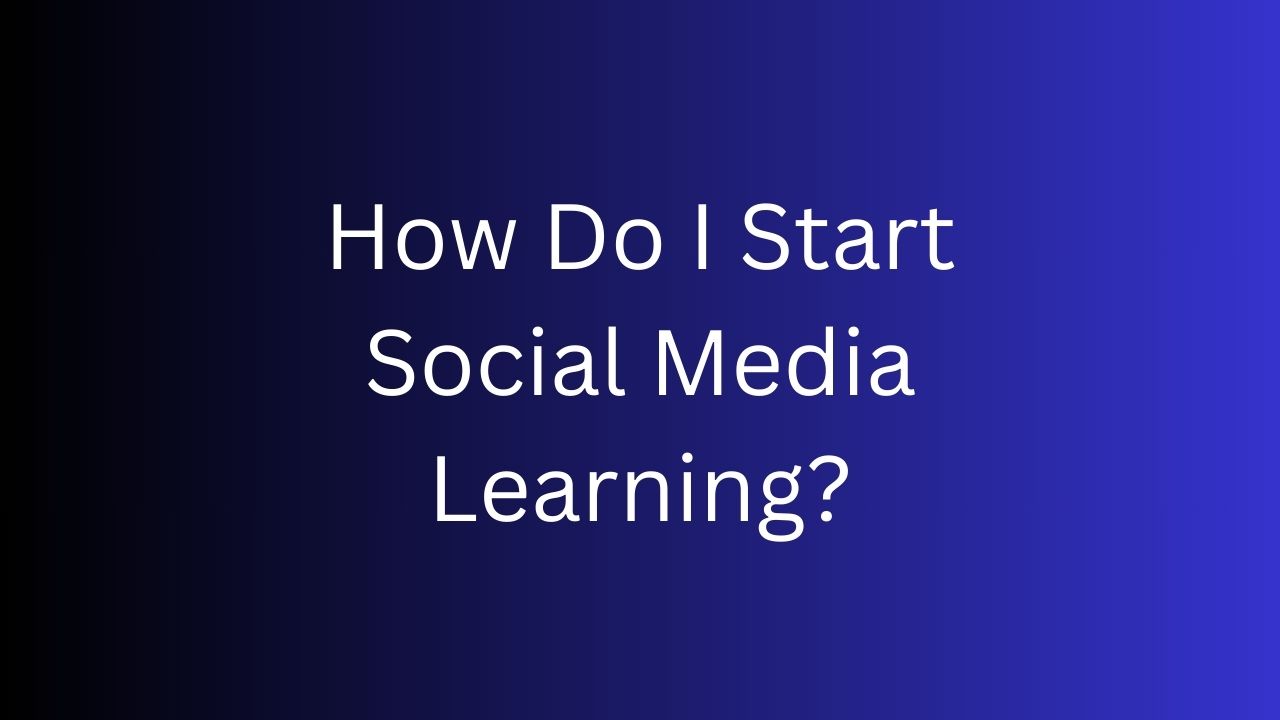Learning about social media can be an exciting journey, as it’s a dynamic and ever-evolving field.
How do I start social media learning for beginners?

1. Define Your Goals
Before diving in, clarify why you want to learn about social media. Are you interested in personal use, business promotion, marketing, or community building?
2. Choose Platforms
Identify the social media platforms that align with your goals. These include Facebook, Instagram, Twitter, LinkedIn, Pinterest, and TikTok.
3. Create Accounts
Set up accounts on the platforms you’ve chosen. Use a consistent username across platforms for brand continuity.
4. Explore Each Platform
Spend time navigating and understanding the features of each platform. Familiarize yourself with settings, privacy options, and user interface.
5. Follow Influencers and Experts
Identify and follow influencers and experts in the social media space. Learn from their content, strategies, and industry insights.
6. Stay Updated
Social media is dynamic, with frequent updates and changes. Follow official blogs, podcasts, and newsletters to stay informed about platform changes and industry trends.
6. Online Courses and Tutorials
Enroll in online courses or watch tutorials to get a structured understanding of social media. Websites like Coursera, LinkedIn Learning, and Udemy offer various courses.
7. Read Books and Blogs
Many books and blogs are dedicated to social media strategy and best practices. Read up on both the theoretical and practical aspects.
8. Practice Regularly
Apply your knowledge by actively using social media. Experiment with creating posts, engaging with others, and understanding the analytics provided by each platform.
9. Networking
Connect with others who are interested in social media. Join relevant groups and forums or attend networking events to exchange ideas and learn from others.
10. Analytics and Measurement
Learn how to use analytics tools provided by social media platforms. Understanding metrics like reach, engagement, and conversion rates is crucial for success.
11. Experiment with Content
Try creating different types of content, such as images, videos, and written posts. Analyze what works best for your audience and adjust your strategy accordingly.
12. Stay Ethical and Respectful
Understand the ethics and etiquette of each platform. Respect privacy, be mindful of cultural differences, and avoid engaging in harmful behaviors.
13. Stay Safe Online
Be cautious about the information you share online. Understand privacy settings and be aware of potential online risks.
14. Adapt and Evolve
Social media is always growing. Be adaptable and open to new trends, tools, and strategies.
Remember, learning about social media is an ongoing process. Stay curious, be open to experimentation, and enjoy the learning journey!
What is social media for dummies?
Social Media for Dummies” is part of the “For Dummies” series, which is known for providing beginner-friendly and comprehensive guides on various topics. If you’re looking for a simplified introduction to social media, a “For Dummies” book on the subject could be a great resource.
Here are some general topics that a “Social Media for Dummies” book might cover:
1. Introduction to Social Media
What social media is and its significance in today’s digital age.
2. Overview of Popular Platforms
Basic explanations of major social media platforms such as Facebook, Twitter, Instagram, LinkedIn, etc.
3. Setting Up Accounts
Step-by-step guides on creating accounts on different platforms.
4. Navigating Social Media Interfaces
How to use the basic features and functions of each platform.
5. Posting and Sharing Content
Tips on creating and sharing different types of content, such as text, images, and videos.
6. Connecting with Others
Building and managing your social network, including adding friends, following people, and joining groups.
7. Privacy and Security
Understanding and managing privacy settings to protect personal information.
8. Social Media Etiquette
Basic do’s and don’ts of online interaction, including engaging respectfully with others.
9. Understanding Social Media Metrics
Introduction to basic analytics and insights provided by social media platforms.
10. Tips for Effective Social Media Use
Strategies for building a positive online presence and maximizing the benefits of social media.
11. Dealing with Challenges
Common issues and challenges users might face on social media and how to address them.
12. Introduction to Social Media Marketing
Basic concepts of using social media for personal or business promotion.
Remember that the “For Dummies” series aims to break down complex topics into easy-to-understand language, making it accessible for beginners.
If you’re new to social media or want a straightforward guide, a “Social Media for Dummies” book could be helpful. You can typically find these books at bookstores, online retailers, or your local library.
What age should start using social media?
There are various answers to the question of what age is appropriate to start using social media, as it depends on multiple factors, including the child’s maturity level, ability to understand online risks, and parental guidance.
However, many social media platforms, like Facebook, Instagram, Snapchat, and TikTok, have age restrictions in their terms of service.
For example, as of my last knowledge update in January 2022, the minimum age to create an account on most major social media platforms is generally 13 years old.
Parents and guardians are crucial in determining when their child is ready for social media.
Here are some considerations:
1. Maturity Level
Evaluate your child’s maturity and ability to understand and navigate the online world responsibly.
2. Communication Skills
Ensure that your child can communicate effectively and appropriately online.
3. Understanding Risks
Teach your child about online risks such as cyberbullying, privacy concerns, and the importance of responsible digital behavior.
4. Supervision and Guidance
Be prepared to provide active supervision and guidance, especially in the early stages of your child’s social media use.
5. Platform Policies
Familiarize yourself with the age requirements of the specific social media platforms your child is interested in.
6. Open Communication
Establish open communication with your child about their online experiences. Encourage them to talk to you if they encounter any issues.
7. Family Rules
Set clear family rules and boundaries regarding social media use, screen time, and online behavior.
It’s important to note that the digital landscape evolves, and social media platforms may update their policies. Stay informed about the platforms your child is interested in, and be proactive in addressing online safety.
Ultimately, deciding when a child, especially social media beginner, should start using social media is personal and should be based on carefully considering the child’s readiness and the family’s values.
